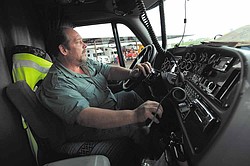For the long haul
MCT
Glenn Horack parks his rig at a truck stop off Interstate 80 in Gary, Indiana, May 11, 2011. Like many truckers, Glenn put on a lot of weight over the years due to his sedentary job, the long hours required, and the quality of food available to him at truck stops. His wife, Karla, keeps him honest and a slow cooker. Horack, who has dropped 100 pounds in the last year, still has plenty of roadblocks.
U.S. revising laws governing how long truckers can drive without a break
Chicago Tribune
CHICAGO
Once tipping the scales at 412 pounds, commercial driver Glenn Horack now carries two precious things in his Peterbilt truck to help with weight loss: His wife, Karla, — who keeps him honest — and a slow cooker.
But Horack, who has dropped 100 pounds in the last year, still has plenty of roadblocks.
Like most professional drivers, the longer he sits, the more he gets paid.
His schedule is erratic; he has limited healthy food choices and little opportunity to exercise.
At one point he stopped smoking, but then the weight crept back.
“The barriers a typical American faces are tenfold for truckers,” said Chelle Pfiffner, a health and wellness consultant for the trucking industry who worked with the Horacks.
“They have time pressures, set forth by the employer, by the customer and even the shipper. Plus most don’t have the social support a typical person would have. They’re independent, isolated individuals.”
Concerned about the health of commercial drivers and the safety of the nation’s roads, the U.S. is revising laws governing how long truckers can drive without a break. Long work hours are linked to sleep loss; tired truckers are at greater risk of obesity, cardiovascular disease and diabetes.
Some studies, meanwhile, suggest obesity is linked to sleep apnea in truck drivers, which increases the risk of motor vehicle accidents.
An estimated 55 percent of commercial motor vehicle drivers are obese, compared with 30 percent of all adult male workers, according to federal data.
Truckers, fearing that more stringent health regulations may threaten their licenses, are starting to seek out help.
Some, like Alabama’s Allen Herndon, who went from 300 to 190 pounds — get up at 3:30 a.m. to run and have turned their trucks into gyms.
Some companies have installed grooved panels on the trucks for drivers to hold while stretching, since drivers who stretch and sleep are less likely to suffer injuries from long term travel.
And the TravelCenters of America offers a StayFit program at select locations, which includes some healthier food options, fitness rooms, and walking and running trail maps.
Still, one of the biggest challenges is the culture, said Pfiffner, a vice president at Fusion Sleep, a company that helps truckers with sleep issues. “You’re atypical if you’re a healthy weight,” she said. “Guys tell us if they’re jogging or walking, other guys get on the CB and make fun of them.”
Then there are the economics of truck stops, she said. If the healthy food isn’t selling, the center can’t afford to keep it.
Pfiffner believes a serious culture shift is needed and it will take healthy role models within the driving community.
Glenn and Karla, for example, of Elkland, Mo., began team driving two years ago. Married for 28 years, they spend about three months on the road at a time; while one sleeps, the other drives a 10-hour shift.
“It’s easier with Karla here; she cooks on the truck,” said Glenn, who is trying to quit smoking again and lose another 60 pounds. “The main thing I did was quit drinking soda and start eating smaller meals.”
Karla, who is 5-foot-4-inches and 212 pounds, is trying to exercise more, improve her eating habits and shop for healthier food.
But exercise is still a challenge. Glenn will walk around the truck but Karla doesn’t feel safe walking around the parking lot at night and is battling sciatica.
Still, with a skillet and a slow cooker, she’s happy to help cook meals and replace his Ho Hos with carrot sticks.
“It takes us twice as long to go to the grocery store because we’re reading labels,” she said. “And he won’t wear his reading glasses.”
Copyright 2011 Associated Press. All rights reserved. This material may not be published, broadcast, rewritten, or redistributed.
 43
43

